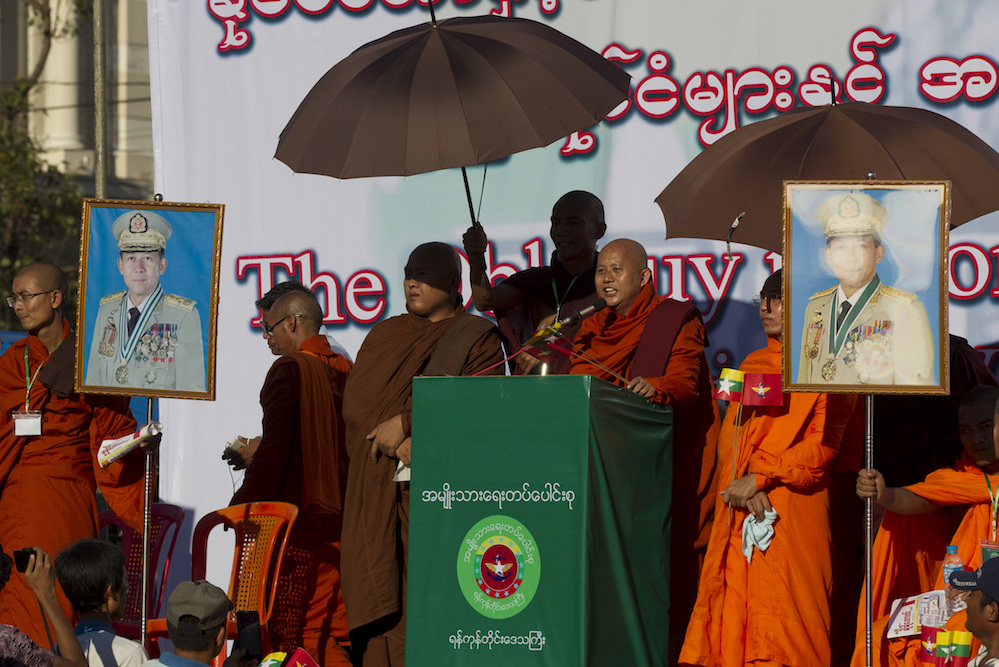
Buddhist monk, Ashin Wirathu, who led Mynamar’s anti-Muslim nationalist party, 969, speaks during a pro-military rally in Yangon in 2018. Courtesy of Thein Zaw/Associated Press.
When Franklin Graham, the son of the famous Christian evangelist Billy Graham, praised President Donald Trump for banning Muslims from entering the United States, he said that America was at “war with Islam.” Of the 80 percent of evangelical Christians who supported Trump’s election, doubtless many agreed with the idea that religion should be a test of American citizenship. And thus, a strain of Christian, anti-immigrant xenophobia is clearly on the rise in the United States, much like the other religious nationalisms—Muslim, Buddhist, or otherwise—that are sweeping places around the world.
These aggressive cultural-religious nationalisms have asserted themselves not only in the U.S. and Europe, but also from Myanmar to the Middle East. Because this is a global phenomenon, it raises the question of whether these nationalisms are related in some way to globalization.
Answering the question requires unpacking a paradox. Globalization is marked by a rapid mobility of peoples, mass migrations, the proliferation of diaspora cultures, and a transnational sense of community facilitated by internet relationships. But despite all these exchanges, religious nationalism—which appears to take an inflexible stance towards local identities—persists, and in fact flourishes, in this global environment. Are these forces—globalism and nationalism—working against each other, as the common wisdom goes, or are they somehow encouraging each other?
To look at that question, we have to explore why local loyalties and parochial new forms of ethno-religious nationalism have surfaced in today’s sea of post-nationality.
One superficial answer is that this moment we are in is an anomaly, and it will soon pass. After all, history is poised on the brink of an era of globalization, hardly the time for new national aspirations to emerge. In fact, some observers have cited the appearance of ethnic and religious nationalism in the former Yugoslavia and the former Soviet Union, Algeria and the Middle East, South Asia and Japan, and among right-wing movements in Europe and the United States as evidence that globalization has not, in fact, reached all quarters of the globe.
But is this really the case? Is it possible to see these quests for local identities and new nationalisms not as anomalies in the homogeneity of globalization, but as further examples of its impact? In case studies that I have examined, I have found that the paradox of new nationalisms in a global world can be explained, in part, by seeing them as responses to one or more of several globalizing forces.
In many cases the new ethnic and religious movements are direct reactions to globalization—a fear of the “new world order,” as some patriot movements in the United States have put it. Such movements express angst over the loss of identity and privilege in a world that is rapidly becoming multicultural.
Ashin Wirathu, the Buddhist monk in Myanmar who has encouraged violence against the Muslim minority, told me that his stance was simply for the defense of the Buddhist community. “We are a tiny dot of Burmese Buddhist culture at the edge of a sea of Islam,” he said, adding that he did not want his traditions to be forever dashed away. This is a sentiment articulated by Muslims in Iraq and by Christians in the United States as well.
But many of these religious nationalist movements are also responses to a perceived failure in secular nationalism. Though the European Enlightenment touted secular nationalism as the most just and progressive form of political organization for the modern world, this vision is an empty promise in many places. The global political standard—the secular nationalisms of Europe and the United States—look more like vestiges of European colonialism in parts of the developing world.
From Egypt to India, new nationalists have criticized secular leaders for ignoring their cultural heritages and attempting to create imitations of European and American politics for their own gain. The corruption and inefficiency of many of these governments in formerly colonial states does little to assure their citizens that this secular model actually works in their interests. An exasperated follower of the Islamic State in Iraq said to me, “What have we gained from being a secular state?”
This sense of despair over the failures of secular nationalism comes at a time when it as an institution has already been weakened by global forces. Instant, worldwide communication, the erosion of traditional economic boundaries, and the easy mobility of populations across national lines have put secular nation-states under siege.
That vulnerability of the nation-state, in turn, has been the occasion for new ethno-religious politics to step into the breach and shore up national identities and purposes.
These ethno-religious politics come in many forms. Some, like the Islamic State, are transnational and reach across national borders often through the vehicle of cyber networks. Others, like some Christian militants in the U.S., are virulently anti-global, and rail against the “new world order.” In each case, however, while activists may disparage the globalization that has weakened the secular nation-states, it is often that very same globalization that has given the ethno-religious nationalists the opportunity to organize on a transnational scale.
Our current global era is full of ironies and ambiguities, and these movements of new nationalisms and transnationalism are good examples. Though they may appear at first glance to harken to premodern forms of provincial politics, they are in fact postmodern creatures of the global age. Sometime they align with parochial nationalism and sometimes with more transnational ideologies. But in both cases, they stand in a very uneasy relationship with the globalizing economic and cultural forces of the 21st century.




Send A Letter To the Editors